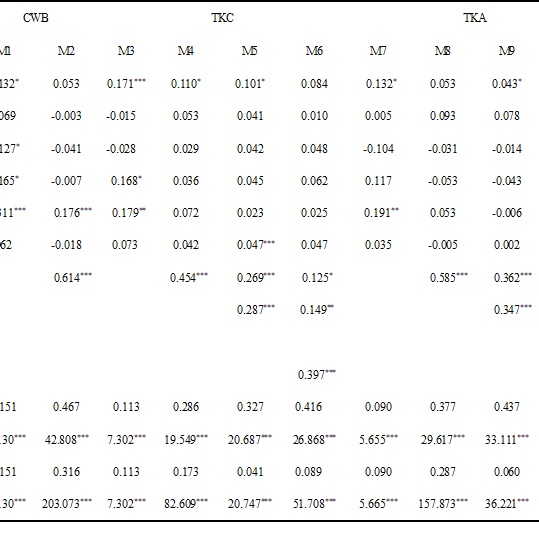 PDF(772 KB)
PDF(772 KB)


 PDF(772 KB)
PDF(772 KB)
 PDF(772 KB)
PDF(772 KB)
动态视角下人际信任对隐性知识共享意愿的影响研究
The Influence of Interpersonal Trust on Tacit Knowledge Sharing Willingness from the Dynamic Perspective:Mediating Effect of Sense of Cognitive Well-being
 ,
,

[目的/意义] 旨在考察隐性知识共享的动态性,进一步探讨人际信任对知识型员工隐性知识共享意愿的内在机理。[方法/过程] 将隐性知识共享细分为知识获取与知识贡献两个维度,并根据幸福人假设,构建一个被认知幸福感中介的非递归模型,利用山东胶东半岛地区的350名知识型员工的调研问卷进行实证分析。[结果/结论] 隐性知识贡献与知识获取意愿之间相互交融与互为作用;人际信任对认知幸福感产生显著促进作用;认知幸福感部分中介了人际信任对隐性知识贡献及获取意愿的正向影响。
[Purpose/significance] The paper aims to examine the dynamic nature of tacit knowledge sharing and further explore the internal mechanism of interpersonal trust on knowledge workers’ tacit knowledge contribution willingness. [Method/process] By subdividing the tacit knowledge sharing into two dimensions of knowledge acquisition and knowledge contribution to examine the dynamic nature of tacit knowledge sharing, and based on the assumption of happiness, a mediated nonrecursive model was constructed from the perspective of sense of cognitive well-being. Meanwhile, using survey data of 350 knowledge workers from the Jiaodong peninsula in Shandong, this paper conducted an empirical analysis.[Result/conclusion] The result shows that there is a relationship of mutual interaction and integration between tacit knowledge contribution and acquisition willingness; interpersonal trust has significant positive effect on sense of cognitive well-being; sense of cognitive well-being partly mediates the positive influence of interpersonal trust on tacit knowledge contribution and tacit knowledge acquisition willingness.

人际信任 / 认知幸福感 / 隐性知识贡献 / 隐性知识获取
interpersonal trust / sense of cognitive well-being / tacit knowledge contribution / tacit knowledge acquisition
| [1] |
JOIA L A, LEMOS B. Relevant factors for tacit knowledge transfer within organizations[J].Journal of knowledge management, 2010, 14(3):410-427.
|
| [2] |
张亚军,张金隆,张千帆,等.威权和授权领导对员工隐性知识共享的影响研究[J].管理评论,2015(9):130-139.
|
| [3] |
王娟茹,罗岭.知识共享行为、创新和复杂产品研发绩效[J].科研管理,2015(6):37-45.
|
| [4] |
南旭光.知识获取性视角下隐性知识的转化和流动[J]. 科学学与科学技术理,2010(3):107-112.
|
| [5] |
BOEHM J K L S. Does happiness promote career success?[J]. Journal of career assessment, 2008,16(1):101-116.
|
| [6] |
GEORGE J M. State or trait: effects of positive mood on prosocial behaviors at work.[J]. Journal of applied psychology, 1991,76(2):299-307.
|
| [7] |
卢苓霞,王彦勋. 幸福人假设及在管理领域的意义[J]. 经济管理, 2007(13):92-96.
|
| [8] |
CHUMG H F, COOKE L, FRY J, et al. Factors affecting knowledge sharing in the virtual organisation: employees’ sense of well-being as a mediating effect[J]. Computers in human behavior, 2015,44(c):70-80.
|
| [9] |
肖志雄,聂天奇.知识型员工的心理距离与知识共享意愿关系的实证研究[J].图书馆学研究,2018(6):92-101.
|
| [10] |
HOOFF B V D, RIDDER J A D. Knowledge sharing in context: the influence of organizational commitment, communication climate and CMC use on knowledge sharing[J]. Journal of knowledge management, 2004,8(6):117-130.
|
| [11] |
PANTELI N, SOCKALINGAM S. Trust and conflict within virtual inter-organizational alliances: a framework for facilitating knowledge sharing[J]. Decision support systems, 2005, 39(4):599-617.
|
| [12] |
MCALLISTER D J. Affect-and cognition-based trust as foundations for interpersonal cooperation in organizations[J]. Academy of management journal,1995, 338(1):24-59.
|
| [13] |
RIDINGS C M, GEFEN D, ARINZE B. Some antecedents and effects of trust in virtual communities[J]. Journal of strategic information systems, 2002,11(3/4):271-295.
|
| [14] |
CHOW W S, LAI S C. Social network, social trust and shared goals in organizational knowledge sharing[J]. Information & management, 2008,45(7):458-465.
|
| [15] |
肖冬平,顾新.知识网络中隐性知识的共享困境及其克服路径——基于非正式网络的观点[J]. 图书情报工作,2009,53 (2):108-112,138.
|
| [16] |
谭云清.关系机制、契约机制对提供商知识获取的影响[J].科研管理,2017(2):35-43.
|
| [17] |
黄亮.中国企业员工工作幸福感的维度结构研究[J]. 中央财经大学学报, 2014 (10):84-92.
|
| [18] |
许颖.差序氛围、组织支持感知与隐性知识共享之关系探讨[J]. 科技管理研究, 2015(9):133-139.
|
| [19] |
李常洪,张曦.组织中情绪氛围对隐性知识共享的影响——基于多agent的仿真研究[J].情报理论与实践, 2016 (9):77-81.
|
| [20] |
张淑娟.员工关系网络与工作幸福感作用机制研究[D]. 太原:山西财经大学, 2015.
|
| [21] |
黄菲, 史虹, 史丹青.工作幸福感对知识型员工离职意向影响的实证研究[J]. 世界科技研究与发展, 2016(4):905-909.
|
| [22] |
宋佳, 王兰兰, 杨绍清,等.高三学生人际关系与人际信任的特点及关系[J]. 中国健康心理学杂志, 2014(6):930-932.
|
| [23] |
YIP W, SUBRAMANIAN S V, MITCHELL A D, et al. Does social capital enhance health and being? well-evidence from rural China[J]. Social science & medicine, 2007,64(1):35-49.
|
| [24] |
HELLIWELL J F, HUANG H. Well-being and trust in the workplace[J]. Journal of happiness studies, 2011,12(5):747-767.
|
| [25] |
SHAO Z, FENG Y, LIU L. The mediating effect of organizational culture and knowledge sharing on transformational leadership and enterprise resource planning systems success: an empirical study in China[J]. Computers in human behavior, 2012,28(6):2400-2413.
|
| [26] |
YONG S H, KIM B, LEE H, et al. The effects of individual motivations and social capital on employees’ tacit and explicit knowledge sharing intentions[J]. International journal of information management, 2013,33(2):356-366.
|
| [27] |
HOLSTE J S, FIELDS D. Trust and tacit knowledge sharing and use[J]. Journal of knowledge management, 2010,14(1):128-140.
|
| [28] |
PODSAKOFF P M, MACKENZIE S B, LEE J Y, et al. Common method biases in behavioral research: a critical review of the literature and recommended remedies [J]. Journal of applied psychology, 2003, 88(5):879-903.
|
| [29] |
周浩, 龙立荣.共同方法偏差的统计检验与控制方法[J]. 心理科学进展, 2004(6):942-950.
|
| [30] |
CHEUNG G W, RENSVOLD R B. Evaluating goodness-of-fit Indexes for testing measurement Invariance [J]. Structural equation modeling, 2002, 9(2):233-255.
|
| [31] |
郑建君, 金盛华, 马国义.组织创新气氛的测量及其在员工创新能力与创新绩效关系中的调节效应[J]. 心理学报, 2009 (12):1203-1214.
|
张春阳: 负责数据分析与内容撰写等;
梁启华: 负责论文思路设计与修改指导等。
/
| 〈 |
|
〉 |